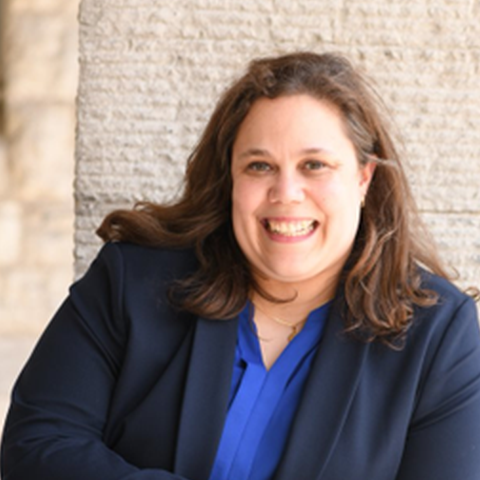
My research projects help to address the following UN Sustainable Development Goals:
Prior to her arrival at Queen’s University, Dr. Payne worked as an engineer in the federal public service (2014-2019). She worked at both Environment and Climate Change Canada and Health Canada in various water, wastewater, and environmental policy and regulatory roles.
Dr. Payne is a new faculty member in Civil Engineering and is currently developing a water research program. She is fascinated by the intersection of environment, public health and engineering. Dr. Payne enjoys adapting molecular biological tools and developing new analytical tools to track contaminants in drinking water and explore the unintended consequences and trade-offs of water quality management strategies. Dr. Payne also works to expand the usefulness of wastewater-based epidemiology through optimizing viral recovery, exploring the impact of sampling techniques on viral recovery, and adopting assays to identify other viral targets of public health concern. Dr. Payne is a co-Director of both the Drinking Water Research Group and the Queen’s Wastewater Surveillance Initiative, a member of the Beaty Water Research Centre, and a member of the Contaminants of Emerging Concern Research Excellence Network. She is also a Principal Investigator member of the Ontario Wastewater Surveillance Consortium.
Pei, Y., Prepas-Strobeck, N., Payne, S.J., She, Z. 2022. Considerations for new manganese analytical techniques for drinking water quality management. AWWA Water Science. 4(3).
Kot, K., Payne, SJ. 2022. Take a Proactive Risk Management Approach to Protect Public Health. Opflow. 48(3):20-22.
Pei, Y., McLeod, J.F., Payne,S.J., She, Z . 2021. A Comparative Study of Electroanalytical Methods
for Detecting Manganese in Drinking Water Distribution Systems. Electrocatalysis.12:176–187
Kogo, A., Payne, S.J., Andrews, R.C. 2017. Comparison of three corrosion inhibitors in simulated partial lead service line replacements. Journal of Hazardous Materials, 329: 211-221.
Kogo, A., Payne, S.J., Andrews, R.C. 2017. Impact of corrosion control on biofilm development in simulated partial lead service line replacements. Environmental Engineering Science, 34(10):711-720.
Payne, S.J., Piorkowski, G.S., Truelstrup Hansen, L., Gagnon, G.A. 2016. Impact of zinc orthophosphate on drinking water biofilms influenced by lead and copper. Journal of Environmental Engineering, 142(2).
Woszczynski, M., Bergese, J., Payne, S.J., Gagnon, G.A. 2015. Comparison of sodium silicate and phosphate for controlling lead release from copper pipe rigs. Canadian Journal of Civil Engineering, 42:953-959.
Zhou, E., Payne, S.J., Hofmann, R., Andrews, R.C. 2015. Factors affecting lead release in sodium silicate treated partial lead service line replacements. Journal of Environmental Science and Health, Part A, 50(9): 922-930.
Krkosek, W.H., Payne, S.J., Gagnon, G.A. 2014. Removal of acidic pharmaceuticals within a nitrifying recirculating biofilter. Journal of Hazardous Materials, 272: 85-93.
Payne, S.J., Besner, M-C., Lavoie, J. Krentz, C.A., Truelstrup Hansen, L., Friedman, M., LeChevallier, M.W., Prévost, M. & Gagnon, G.A. 2010. Molecular techniques and data integration: investigating distribution system coliform events. Journal of Water Supply: Research and Technology – AQUA, 59(5): 298-311.
Friedman, M., Hanson, A., Dewis, K., Kirmeyer, G., LeChevallier, M.W., Gagnon, G., Truelstrup Hansen, L., Krentz, C.A., Mosher, M., Payne, S.J., Rosen, J., Hargy, T., Sobrinho, J., Besner, M-C. & Prévost, M. 2009. Strategies to manage and respond to total coliforms and E. coli in drinking water distribution systems. Water Research Foundation: Denver, CO, U.S.A.
Murphy, H.M., Payne, S.J. & Gagnon, G.A. 2008. Sequential UV- and chlorine-based disinfection to mitigate Escherichia coli in drinking water biofilms. Water Research, 42: 2083-2092.
Gagnon, G.A., Murphy, H.M., Rand, J.L., Payne, S.J., Springthorpe, S., Matias, F., Nokbeh, R. &
Sattar, S.A. 2007. Coliforms in distribution systems: integrated disinfection and antimicrobial resistance. Water Research Foundation: Denver, CO, U.S.A.
Pedagogical publications
Payne, S.J. 2013. Beyond Numbers: Supporting Writing in Engineering, Teaching Innovation Projects, 3(1):3.
Our 2022/2023 Graduate Student and Post-Doctoral Team includes Nishana Ramsawak (PhD Candidate), Yu Pei (PhD Candidate), Susie Dunn (MASc student), Laura Meteer (MASc student), Natalie Niro (MASc student), Kailey Browne (MSc student), Ben Anderson (MASc student), Tiffany Wong (MASc student), Dr. Abdul Rahman Alashraf (Post-Doctoral Fellow) and Dr. Armineh Azizi (Post-Doctoral Fellow).
Our team works in a variety of settings – in the lab and in the field. We are actively engaged in research that advances science and serves the public. We, also, actively engage with young people to encourage the next generation of innovators.
Kailey Browne, MSc student, adapts and advances electroanalytical detection techniques for monitoring water quality.
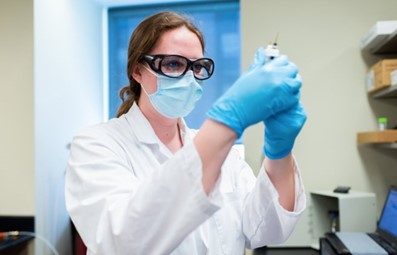
Dr. Armineh Azizi collects a sewage sample to monitor for the SARS-CoV-2 virus (SARS-CoV-2 is the virus that causes COVID-19). Dr. Azizi leads the passive sampling programme in the Queen’s wastewater surveillance initiative team.
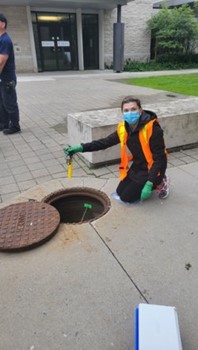
Tiffany Wong, MASc student, analyses samples to monitor for SARS-CoV-2. Tiffany’s work will advance the optimization of viral genetic material from wastewater.
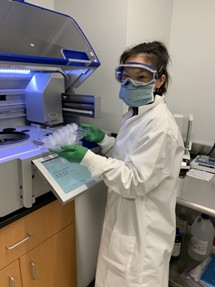
Natalie Niro, MASc student, explores ways to improve our interpretation of viral signals from wastewater. She also combines her 3D printing and programming skills to develop innovative low-cost wastewater sampling tools and fit-for-purpose experimental vessels.
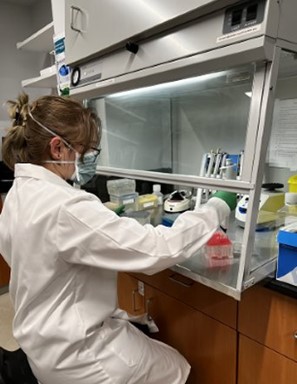
In addition to her PhD work on drinking water quality degradation and management, Nishana Ramsawak is an active mentor to young people - encouraging them to explore through science, engineering and technology.
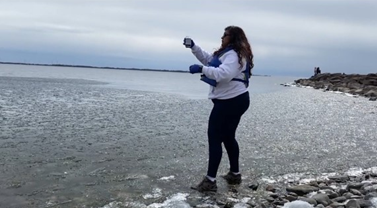
Dr. Payne is building a top-tier research team of motivated graduate students who are passionate about engineering, environment and public health. Students who are keen to apply their ingenuity to tackle some of the next big challenges in water are encouraged to contact her directly.